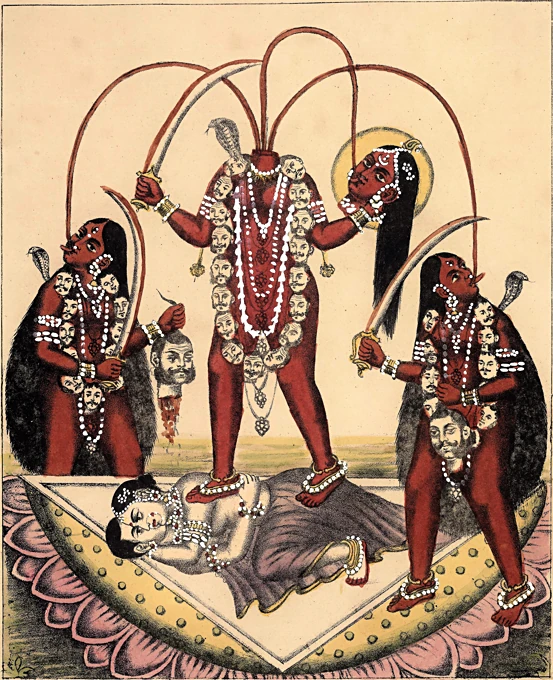In the end, everything is meaningless. Your death is certain, and final. No heaven awaits; you just cease to exist. Life is but a spark in the infinite blackness, a spark that appears, flickers, and dies forever. What meaning could that have? You will soon be forgotten, nothing you do can make any difference in the long run, none of it matters.
This sales pitch1 somehow seems plausible when you are in the grip of nihilism, which inhibits asking questions that might lead you to reject it:
- Is it true that your upcoming death means that everything is meaningless now? (No.)
- What reasoning leads from “death is certain and final” to “everything is meaningless”? (No explicit argument supports this claim; it’s just asserted.)
- What makes it emotionally compelling, even though it makes no sense? (Several half-thought underlying intuitions, plus the usual sleazy sales tricks.)
Mistaken intuitions about mortality are often key to nihilism’s power overall. “Death means everything is meaningless” may be compelling when your own upcoming death is salient and fearsome. It is a central nexus for nihilistic ideas, tying in with many other mistaken reasons that seem to support the stance. This page digs in to expose and untangle them.
Some of these underlying ideas are secular, but many derive from Christian theories about an afterlife. I’ll treat them in that order.
Rationally speaking…

We know “death means everything is meaningless” is wrong because everything isn’t meaningless. So, at the level of rationality, the remaining question is where the error in reasoning lies.
A usual version is “after you are dead, everything will be meaningless for you, so everything is meaningless, really.” This proves too much. An analogous argument is: “after you use up your current tube of toothpaste, you won’t be able to get any toothpaste out of it, so really it doesn’t contain any toothpaste at all, and never did.”2
How do we get from “in future, this will be true” to “it is true now”? “No meaning for corpses” does not logically imply “no meaning for mortals.” As with so much nihilistic justification, there seems to be no explicit reasoning, so there’s no specific error to locate. I went through many texts that simply jumped the gap, without any supporting argument.
Often, however, they do include many pages of repetitive verbiage that, at the level of logic, amount to simply asserting the implication over and over. This sales patter generally embeds particular rhetorical tricks and implicit intuitions, though. The rest of this page is about those.
Death and eternity
For there is no remembrance of the wise more than of the fool for ever; seeing that which now is in the days to come shall all be forgotten. And how dieth the wise man? as the fool.
Therefore I hated life; because the work that is wrought under the sun is grievous unto me: for all is vanity and vexation of spirit.
—Ecclesiastes 2:16–17
“No meaning for mortals” is closely connected with “no eternal meaning,” discussed earlier. Often they are intertwined in nihilist soliloquies, and reinforce each other. Their underlying intuitions and implications are somewhat distinct, though.
“Eternal meaning” is a special kind of meaning; you can deny it while conceding that transient mundane meaning exists (although it doesn’t count). By contrast, when nihilism invokes death, it is often to claim that nothing in life is meaningful at all. So the first is lite nihilism, and the second is 190-proof.
On the other hand, “no eternal meaning” makes a much stronger temporal demand. A meaning that lasted a mere trillion years would count as inadequate by its standard. A mere eye-blink; not even all the stars will have died yet! “No meaning because death” looks ahead only as far as the end of your own life. Or, sometimes it reminds you that you cannot live on in memory or through your deeds, since they will be forgotten in a few centuries at most.
Duration matters

Other things being equal, longer-lasting meanings are more meaningful. This suggests eternal meanings—if there were any—would be most meaningful. It does not imply that less-than-eternal meanings are non-existent, or have zero meaning.
It also does not imply that all meaning ends with your personal death. Many of the most meaningful things began long before you were born and will go on long after you are dead. They are meaningful to you, and they will be meaningful to others, probably for centuries.
Duration only weakly correlates with meaningfulness. Hangnails have probably been meaningful to hominids for millions of years, but only very slightly.
Conversely, some things are highly meaningful, but only briefly. An intense love affair, a major spiritual experience, or a triumphant project success may be the most meaningful thing you ever experience. Perhaps that lasts only days or weeks. Then its meaning may rapidly fade. Does that imply it was not meaningful at the time? Why?
What is most meaningful can change, but that does not make it meaningless. Iddo Landau writes:
A person who was engaged in philanthropic work in a third-world country from the ages of twenty to thirty, focused on good parenting from thirty to fifty, wrote good literature from fifty to sixty-five, and ultimately spent years in meditation in a monastery would not therefore seem to have led a meaningless life.3
The transience even of slight meanings does not render them meaningless. Suppose right after you finish sweeping the floor someone tracks dirt across it, and you have to sweep it all over again. That does give the feeling that it was pointless—you may as well not have bothered. However, if the floor stays reasonably clean for a week, you don’t feel the same way. Perhaps it would be better if it remained clean longer, or even forever. But you accept having to sweep the floor periodically, and do not regard it as pointless because its effect is not eternal. If the house burns down and that floor will never be clean again, the times you swept it do not become retroactively meaningless. If you have a stroke and can’t remember having ever swept a floor, that does not make it retroactively meaningless, either. The meaning of sweeping isn’t in your head; the meaning of sweeping is that the floor gets clean at the time.4
This suggests that more significant and longer-lasting meanings are not contradicted by death, even if they are only personal. It doesn’t prove it; maybe death is relevantly different from other meaning-ending events—but that would need explanation.
Headcount matters

Other things being equal, something that is meaningful to more people is more meaningful. If a meaning survives my death, it must be meaningful to people other than me, so maybe it’s a more meaningful meaning. In fact, meanings should be universal, according to this line of thinking.
However, this does not show that merely individual meaning—which ends when I do—doesn’t count at all. Meaning is always meaning for someone in particular, because meanings live in interactions. Eternalism’s hope for inherent meanings, which wouldn’t require anyone to find them meaningful, doesn’t make any sense.
Endings matter
Yes, nothing really matters in the end. But people forget that things often matter quite a lot in the beginning and the middle.
The full meaning of a time-limited project with a definite goal becomes apparent only at its end. Then you can evaluate its success or failure, and the causal roles of events along the way becomes much clearer.
If the project is canceled part-way through, or everything it aimed for is undone immediately afterwards, then the effort was all in vain, and it might be counted as meaningless in retrospect.
Maybe death is like that? The project of your life finally reaches completion, it is finally about to become meaningful, and then it is suddenly canceled.
Often we don’t feel that way even about failed projects, though. Success was not guaranteed, and attempting the goal was worth the effort. Probably also there was growth and companionship and enjoyment along the way.
In any case, life isn’t a single project with a definite goal. Considering it that way is a common intuitive misunderstanding, although usually not held explicitly. It’s wrong and harmful, as we saw in “No meaning of life as a whole,” and will explore further in the chapter on purpose.
It’s attractive, though. The nebulosity of meaning is uncomfortable. We want meaning to be definite, certain, final, simple and understandable. Reducing all meaning to a single overall life-project with a clear goal and endpoint might make that possible. It might be nice if, in the end, God would give an unambiguous yes-or-no judgement, tie up all the loose-end plot points, and tell you what everything really meant.
To pun a bit, if that were even possible, it would be a huge reduction, though. A great reduction in the scope and diversity and richness of meaning. Meaningness is many splendid things; trying to make all life into a single project would exclude most of them.
The usual sleazy sales tricks
Nihilist and Christian sermons on death are nearly indistinguishable. They use the same sales tricks we’ve seen earlier. The intent is to produce the nightmare state of stunned, paralyzed certainty and dread.
They use a hypnotic, repetitive, cyclic drone of abstract statements, chained by vague topical association rather than specific implication, lulling your reasoning ability into somnolence.
To further weaken resistance, they keep reminding you of the awfulness of death, hoping to throw you into depression, which makes meaninglessness seem more plausible and further degrades your cognitive capacity.
Then, they pull the scene change trick we first saw in “No eternal meaning,” switching your view in imagination to the after-death state, painting your experience as cold, dark, lonely, and therefore meaningless. If you allow yourself to be transported by the words, you find yourself already dead, six feet under, with life unreachable and therefore meaningless.5
Finally, Christianity and nihilism offer supposed relief. The Christian afterlife, on the one hand; or the zero-point peace of death-in-life on the other.
Death is bad
Death sucks. Mostly, it seems like a bad idea. On the whole, we’d really rather not. We can imagine circumstances in which we’d choose death, but we’d prefer to choose it, only when it seems like a good idea, not have it forced on us at some inconvenient time when we’ve really only just gotten started with things.
The suckiness of death may taint the rest of life, to varying degrees, perhaps even making it seem pervasively bad. That would not make it meaningless; “bad” is a meaning. However, it can motivate miserabilism, the stance that everything is awful. Miserabilist sermons do usually obsess about death, and shade into horror fiction. It’s common to confuse miserabilism and nihilism, so thinking about death can make “life is pervasively meaningless” seem plausible, if you aren’t thinking clearly. And miserabilism, like nihilism, degrades your reasoning ability.
Desire for immortality, or at least greatly increased lifespan, is natural. It’s also taboo, because immortality is reserved for God. Nobody else is allowed to get it. Except when you are dead.
The Christian afterlife
“The fact of death makes everything meaningless” doesn’t make any sense. It’s not a natural argument; not one you’d be likely to come up with on your own.
It is, of course, Christian apologetics (propaganda).6 The fact of death makes this life meaningless, apologists say; or it is meaningful only in relation to the afterlife, which is what is really meaningful. No afterlife, no meaning.
This is the standard “transcendent meaning” move: denying actual meaning, snatching away your sense of meaningfulness, relocating it to a Neverland which you can reach only by doing whatever authorities demand. If you don’t believe that, then your life is totally empty, which is awful, so you must be wrong. Can you check whether they are telling the truth? No, you can only get to Neverland after you are dead, and it’s not like ghosts are going to come back and say “yeah, Christianity is a total lie, there’s no afterlife, you just stop existing, I’m dead so I know all about it.”
When nihilism denies the Hereafter, it may fail to extend that dismissal to the rest of the story: that real meaning could only be found there. That’s a danger especially for ex-Christian nihilists; but also for the rest of us, since Christian ideas are so deeply woven into secular Western culture.
When nihilism seems attractive, we grasp at any reason to believe it, even when it comes from a religion we reject.
More generally, in sorting out questions of meaningness on the way to the complete stance, it’s helpful to explore ways Christian themes shape your thinking without your awareness, even if you are fully committed to rationalism, atheism, or some other religion.
Death, life, and meaningness
If you don’t believe in an afterlife, the question is what to do in the one you have got. That is the matter of purpose, one of the main themes of Meaningness. In short, the book advocates doing things that are both enjoyable and useful. That seems obvious, but it is somehow elusive. A better understanding of how meaning works in general, and purpose in particular, may help.
- 1.The “spark” sentence is verbatim from William Lane Craig’s “The Absurdity of Life without God,” and the rest of the introductory paragraph paraphrases him, although similar sales patter is standard across Christian apologetics.
- 2.“A human being is not like a toothpaste tube! That’s a terrible analogy—totally invalid.” Well, in what specific, relevant way are they dissimilar? No one seems to explain why death implies meaninglessness during life, and without explaining how that is different from future emptiness implying current emptiness, the parallelism holds.
- 3.Iddo Landau, Finding Meaning in an Imperfect World. Lightly edited for clarity.
- 4.This example also comes from Iddo Landau, with my elaboration.
- 5.Thomas W. Clark’s “Death, Nothingness, and Subjectivity” points out the fallacy here: that, if there is no afterlife, we must continue to have some sort of “blank experience of nothingness” after death, which is permanent and unpleasant. “Rejecting visions of reunions with loved ones or of crossing over into the light, we anticipate the opposite: darkness, silence, an engulfing emptiness, a peaceful oblivion. But we would be wrong.”
- 6.Craig’s “The Absurdity of Life without God” includes a typical version.
